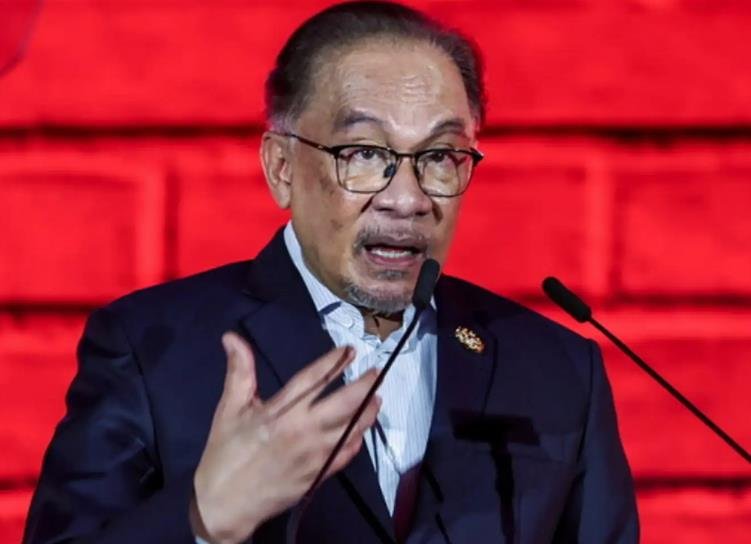Malaysian Prime Minister Datuk Seri Anwar Ibrahim touched down in Riyadh on Monday to participate in the Extraordinary Arab-Islamic Summit, aiming to articulate Malaysia’s position on the ongoing Middle East tensions.
Upon landing at King Khalid International Airport, PM Anwar was greeted by Deputy Governor Prince Mohammed bin Abdulrahman bin Abdulaziz and Riyadh Region Mayor Prince Dr Faisal bin Abdulaziz bin Ayyaf. The Prime Minister also received a guard of honour, underscoring the summit’s significance.
“It’s an honour to be here representing the Malaysian people,” Anwar stated as he was welcomed warmly by Saudi officials. The presence of high-ranking dignitaries highlights the importance of Malaysia’s role in regional dialogues.
Representing Malaysia’s Voice on Conflict
Before his departure from Cairo on Sunday, PM Anwar emphasized his dedication to voicing Malaysia’s concerns over the Israeli Zionist regime’s actions in Palestine and Lebanon. “We stand with those suffering from aggression and humanitarian crises,” he affirmed in a statement shared on social media.
- Humanitarian Aid: Advocating for increased support to affected populations in Palestine and Lebanon.
- Diplomatic Solutions: Pushing for renewed peace talks and ceasefire agreements.
- Regional Stability: Addressing the broader implications of the conflict on Middle Eastern peace.
Anwar’s agenda at the summit includes presenting Malaysia’s strategies for mitigating the conflict and promoting long-term stability in the region.

Summit’s Historical Context and Objectives
This summit marks a pivotal moment, one year after a similar gathering where leaders condemned Israeli actions in Gaza as “barbaric.” The current meeting seeks to build on those discussions, focusing on actionable solutions rather than mere condemnations.
“Alhamdulillah, selamat tiba di Riyadh, Arab Saudi bagi membawa mandat dan suara rakyat Malaysia dalam Sidang Kemuncak Luar Biasa Negara Arab dan Islam yang akan memberi fokus kepada,” read the incomplete statement from Anwar, hinting at the summit’s comprehensive agenda.
Diverse Coalition for Peace
The summit brings together the 57-member Organisation of Islamic Cooperation (OIC) and the 22-member Arab League. These groups encompass countries with varied stances on Israel, ranging from recognition to outright opposition of its regional integration.
Membership Insights:
| Organization | Member Count | Stance on Israel |
|---|---|---|
| OIC | 57 | Mixed recognition and opposition |
| Arab League | 22 | Diverse, some recognize Israel |
This diversity presents both challenges and opportunities for forging a unified approach to peace in the Middle East.
Malaysia’s Strategic Engagement
PM Anwar’s participation underscores Malaysia’s commitment to playing an active role in international diplomacy. His presence is a testament to the country’s dedication to advocating for peace and humanitarian support in conflict zones.
“Malaysia believes in the power of dialogue and collaboration,” Anwar conveyed during his arrival. “Our goal is to work with all parties to achieve a sustainable and just resolution.”
Upcoming Agendas and Discussions
Throughout the summit, leaders will delve into various topics critical to regional stability. These include:
- Ceasefire Negotiations: Establishing immediate halts to ongoing hostilities.
- Humanitarian Relief: Coordinating efforts to provide aid to those affected by the conflict.
- Economic Reconstruction: Planning for the rebuilding of war-torn areas to foster economic growth and stability.
- Security Measures: Developing strategies to prevent future escalations and ensure lasting peace.
These discussions aim to create a comprehensive framework for addressing both the immediate and long-term challenges in the Middle East.
Collaborative Efforts for Lasting Peace
Achieving peace in the Middle East requires collaborative efforts from all stakeholders. Malaysia, through PM Anwar’s leadership, seeks to bridge gaps between conflicting parties and promote mutual understanding and cooperation.
Strategic Initiatives:
- Inclusive Dialogues: Ensuring all voices are heard in peace negotiations.
- International Partnerships: Strengthening ties with global allies to support peace efforts.
- Sustainable Development: Promoting initiatives that address the root causes of conflict, such as poverty and lack of education.
By focusing on these initiatives, Malaysia aims to contribute significantly to the region’s peace and stability.
The Road Ahead
As PM Anwar engages with Arab and Muslim leaders, the international community watches closely. The outcomes of this summit could set the stage for renewed peace efforts and a more stable Middle East.
“We are at a crucial juncture,” Anwar remarked. “Our collective actions today will shape the future of millions affected by this conflict.”
The summit’s success hinges on the willingness of all parties to commit to peace and work collaboratively towards a harmonious resolution.
